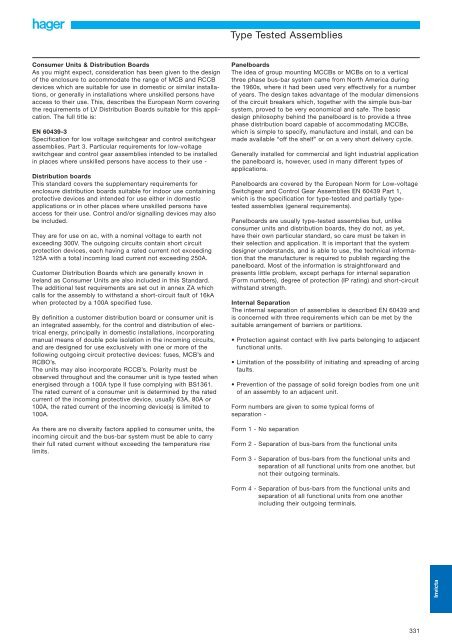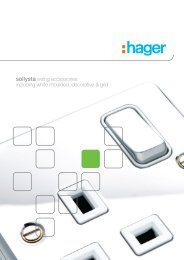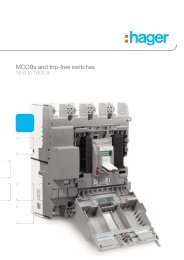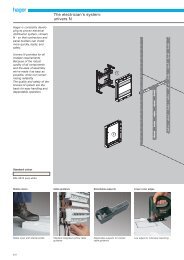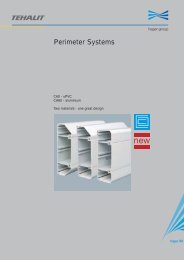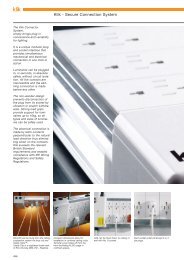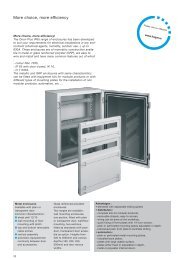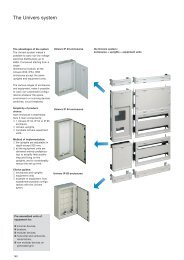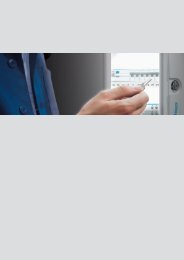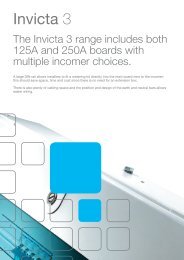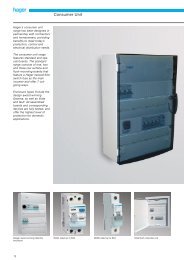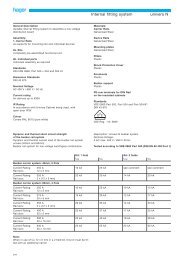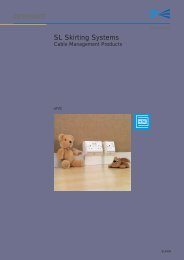You also want an ePaper? Increase the reach of your titles
YUMPU automatically turns print PDFs into web optimized ePapers that Google loves.
Type Tested Assemblies<br />
Consumer Units & Distribution Boards<br />
As you might expect, consideration has been given to the design<br />
of the enclosure to accommodate the range of MCB and RCCB<br />
devices which are suitable for use in domestic or similar installations,<br />
or generally in installations where unskilled persons have<br />
access to their use. This, describes the European Norm covering<br />
the requirements of LV Distribution Boards suitable for this application.<br />
The full title is:<br />
EN 60439-3<br />
Specification for low voltage switchgear and control switchgear<br />
assemblies. Part 3. Particular requirements for low-voltage<br />
switchgear and control gear assemblies intended to be installed<br />
in places where unskilled persons have access to their use -<br />
Distribution boards<br />
This standard covers the supplementary requirements for<br />
enclosure distribution boards suitable for indoor use containing<br />
protective devices and intended for use either in domestic<br />
applications or in other places where unskilled persons have<br />
access for their use. Control and/or signalling devices may also<br />
be included.<br />
They are for use on ac, with a nominal voltage to earth not<br />
exceeding 300V. The outgoing circuits contain short circuit<br />
protection devices, each having a rated current not exceeding<br />
125A with a total incoming load current not exceeding 250A.<br />
Customer Distribution Boards which are generally known in<br />
Ireland as Consumer Units are also included in this Standard.<br />
The additional test requirements are set out in annex ZA which<br />
calls for the assembly to withstand a short-circuit fault of 16kA<br />
when protected by a 100A specified fuse.<br />
By definition a customer distribution board or consumer unit is<br />
an integrated assembly, for the control and distribution of electrical<br />
energy, principally in domestic installations, incorporating<br />
manual means of double pole isolation in the incoming circuits,<br />
and are designed for use exclusively with one or more of the<br />
following outgoing circuit protective devices: fuses, MCB’s and<br />
RCBO’s.<br />
The units may also incorporate RCCB’s. Polarity must be<br />
observed throughout and the consumer unit is type tested when<br />
energised through a 100A type II fuse complying with BS1361.<br />
The rated current of a consumer unit is determined by the rated<br />
current of the incoming protective device, usually 63A, 80A or<br />
100A, the rated current of the incoming device(s) is limited to<br />
100A.<br />
As there are no diversity factors applied to consumer units, the<br />
incoming circuit and the bus-bar system must be able to carry<br />
their full rated current without exceeding the temperature rise<br />
limits.<br />
Panelboards<br />
The idea of group mounting MCCBs or MCBs on to a vertical<br />
three phase bus-bar system came from North America during<br />
the 1960s, where it had been used very effectively for a number<br />
of years. The design takes advantage of the modular dimensions<br />
of the circuit breakers which, together with the simple bus-bar<br />
system, proved to be very economical and safe. The basic<br />
design philosophy behind the panelboard is to provide a three<br />
phase distribution board capable of accommodating MCCBs,<br />
which is simple to specify, manufacture and install, and can be<br />
made available “off the shelf” or on a very short delivery cycle.<br />
Generally installed for commercial and light industrial application<br />
the panelboard is, however, used in many different types of<br />
applications.<br />
Panelboards are covered by the European Norm for Low-voltage<br />
Switchgear and Control Gear Assemblies EN 60439 Part 1,<br />
which is the specification for type-tested and partially typetested<br />
assemblies (general requirements).<br />
Panelboards are usually type-tested assemblies but, unlike<br />
consumer units and distribution boards, they do not, as yet,<br />
have their own particular standard, so care must be taken in<br />
their selection and application. It is important that the system<br />
designer understands, and is able to use, the technical information<br />
that the manufacturer is required to publish regarding the<br />
panelboard. Most of the information is straightforward and<br />
presents little problem, except perhaps for internal separation<br />
(Form numbers), degree of protection (IP rating) and short-circuit<br />
withstand strength.<br />
Internal Separation<br />
The internal separation of assemblies is described EN 60439 and<br />
is concerned with three requirements which can be met by the<br />
suitable arrangement of barriers or partitions.<br />
• <strong>Protection</strong> against contact with live parts belonging to adjacent<br />
functional units.<br />
• Limitation of the possibility of initiating and spreading of arcing<br />
faults.<br />
• Prevention of the passage of solid foreign bodies from one unit<br />
of an assembly to an adjacent unit.<br />
Form numbers are given to some typical forms of<br />
separation -<br />
Form 1 - No separation<br />
Form 2 - Separation of bus-bars from the functional units<br />
Form 3 - Separation of bus-bars from the functional units and<br />
separation of all functional units from one another, but<br />
not their outgoing terminals.<br />
Form 4 - Separation of bus-bars from the functional units and<br />
separation of all functional units from one another<br />
including their outgoing terminals.<br />
Invicta<br />
331


